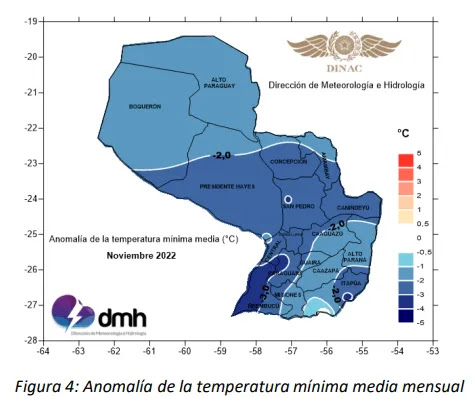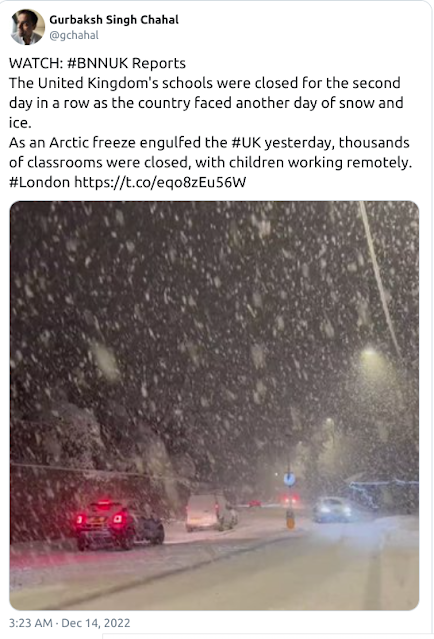RECORD COLD CARIBBEAN
It’s been holding cold across much of The Caribbean of late.
Guadeloupe, for example, has experienced a had a very cool beginning to December. From the 1st to the 10th, the island’s international Airport Le Raizet has registered its coldest start to any month in at least 30 years.
Meanwhile in Martinique on Sunday, the low of 12.1C (53.8F) logged at Morne-Rouge/Champflore is now the lowest temperature ever recorded on the island, besting the 12.6C (54.7F) set during the January of 1975 (solar minimum of cycle 20).
COLDER-THAN-AVERAGE NOVEMBERS FOR BRAZIL AND PARAGUAY
Turning to South America, November in both Brazil and Paraguay finished colder-than-average.
For Brazil, it was particularly chilly across the eastern half of the country; while in Paraguay, it anomalously-cold across the country, with temperature minimums ranging from 1C and 2C below the multidecadal norm.
STATE OF VICTORIA JUST SET ITS COLDEST SUMMER TEMP EVER
Australia has been at it again.
Following the nation’s colder-than-average winter, spring and now start to summer (which included Australia’s lowest summer temp ever recorded), another nine December cold benchmarks have been busted this morning (Dec 14).
The most impressive was the -5.4C (22.3F) set at Mt. Hotham, a reading which felled the State of Victoria’s lowest December (and summer) temperature ever recorded, the -5.2C (22.6F) from Dec 20, 1978 (solar minimum of cycle 20).
Gabo Island is also worth a mention.
It reached 6.1C (43F) this morning, which bests an even-longer standing record than Hotham.
The AGW Party is keen to blame Australia’s persistent and historic cold on a rare third-consecutive La Niña. Fair enough. But what they fail to mention is that their global warming hypothesis decreed El Niño to be the dominant ENSO pattern moving forward.
La Niñas, on the other hand, are tied to planetary cooling.
This real-world observation shocked the climate modelers, who themselves admit they are now scrambling for answers:
UK FREEZE BREAKS RECORDS
It’s been holding exceptionally cold across the UK over the past 10-or-so days.
The mercury plunged to -15.7C (3.7F) in Braemar, Scotland on the morning of Dec 12; one of the lowest mid-December temperatures ever recorded in books dating back to the 1800s.
The same location sank even lower the following morning, registering an astonishing -17.3C (0.9F) — a reading the AGW Party genuinely claimed would be an impossibility by now.
The days didn’t warm up much, either. Braemar struggled to just -9.3C (15.3F) on Monday; the UK’s lowest maximum since the historically-cold readings (again in books dating back to the 1800s) suffered during the December of 2010.
The country’s rare December snow is also proving disruptive.
While across Europe, the mercury has been plunging there, too, draining gas reserves far-quicker than hoped.
Switzerland, for example, suffered -27C (-16.6F) this week, in Ofen Pass, Graubünden.
Both Europe’s balmy summer heat and now ferocious December freeze can be FULLY explained by a low solar activity-induced meridional jet stream flow — no world-reshaping, CO2-driven ‘climate scam’ required.
FEROCIOUS ARCTIC BLAST ON COURSE TO SLAM U.S.
It’s been incredibly cold and snowy across the pond, too, in North America.
And eyeing the latest GFS run (shown below), another truly frigid blast of polar air is on the way, due to invade the West initially, but with Central and Eastern provinces/states on course to cop the worst of it over the weekend and throughout next week:
GFS 2m Temperature Anomalies (C) Dec 17 – Dec 25 [tropicaltidbits.com].
The freeze is forecast to deliver temperatures some -30C below the seasonal norm.
It will also be accompanied by heavy, likely record-breaking snow:
GFS Total Snowfall (inches) Dec 14 – Dec 30 [tropicaltidbits.com].
GFS Total Snowfall (inches) Dec 14 – Dec 30 [tropicaltidbits.com].
This isn’t hyperbole, North Americans; if the forecast holds true, this will prove a disruptive, life-threatening cold event, and one arriving smack-bang in the middle of the holidays, too.
Prepare.
Recommend this post and follow
The Life of Earth










No comments:
Post a Comment
Stick to the subject, NO religion, or Party politics